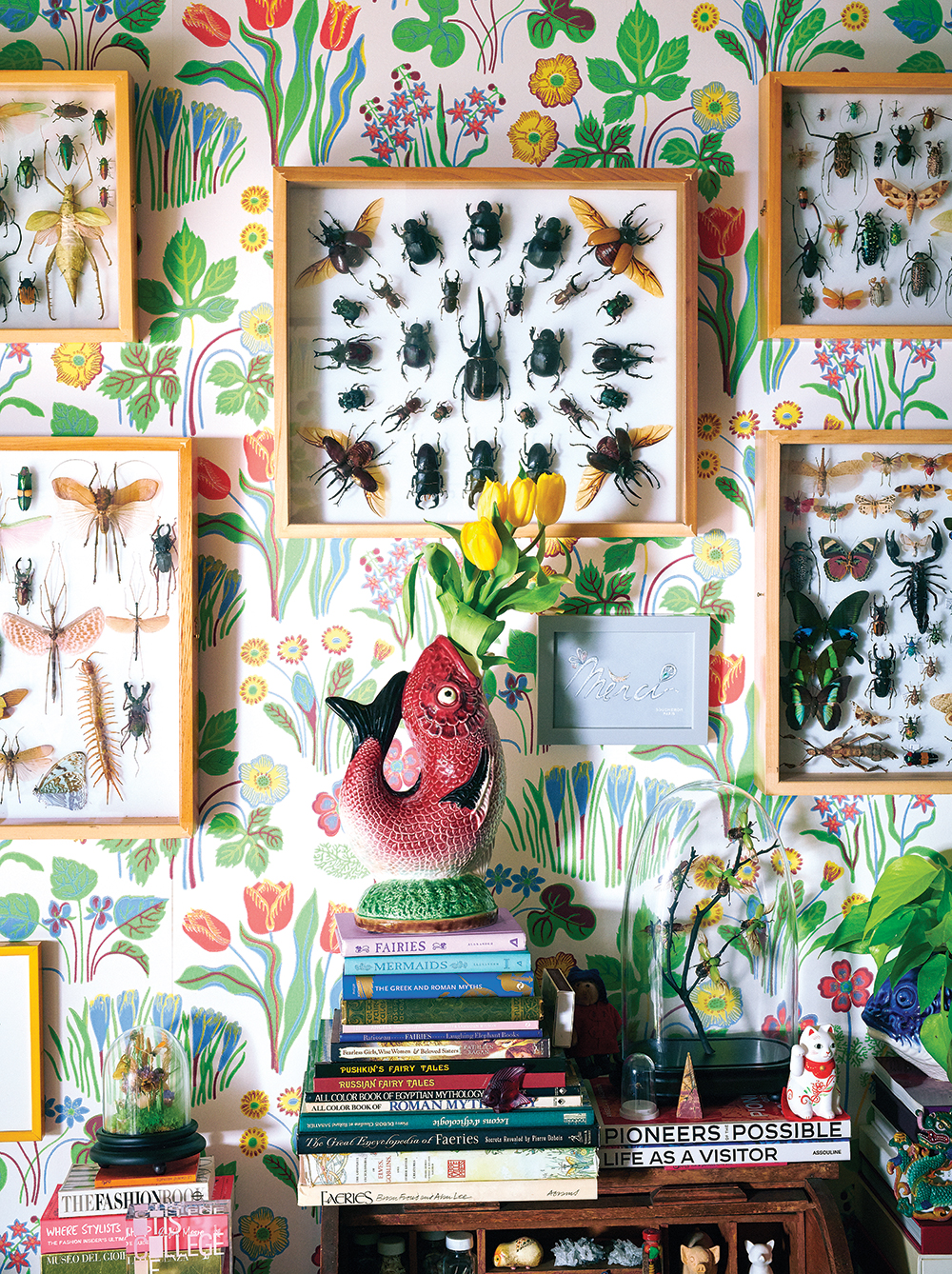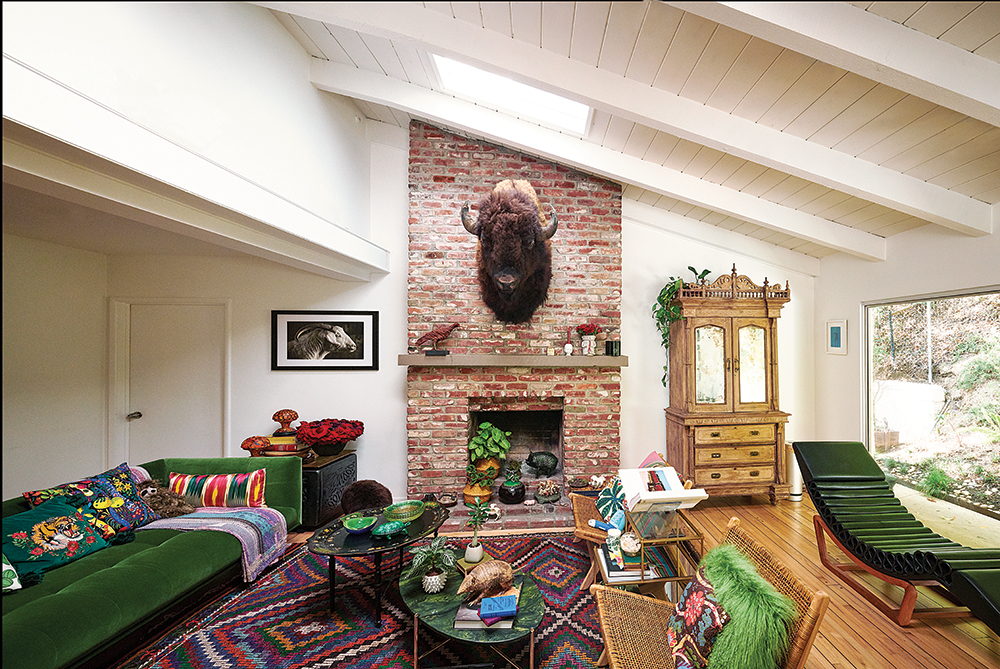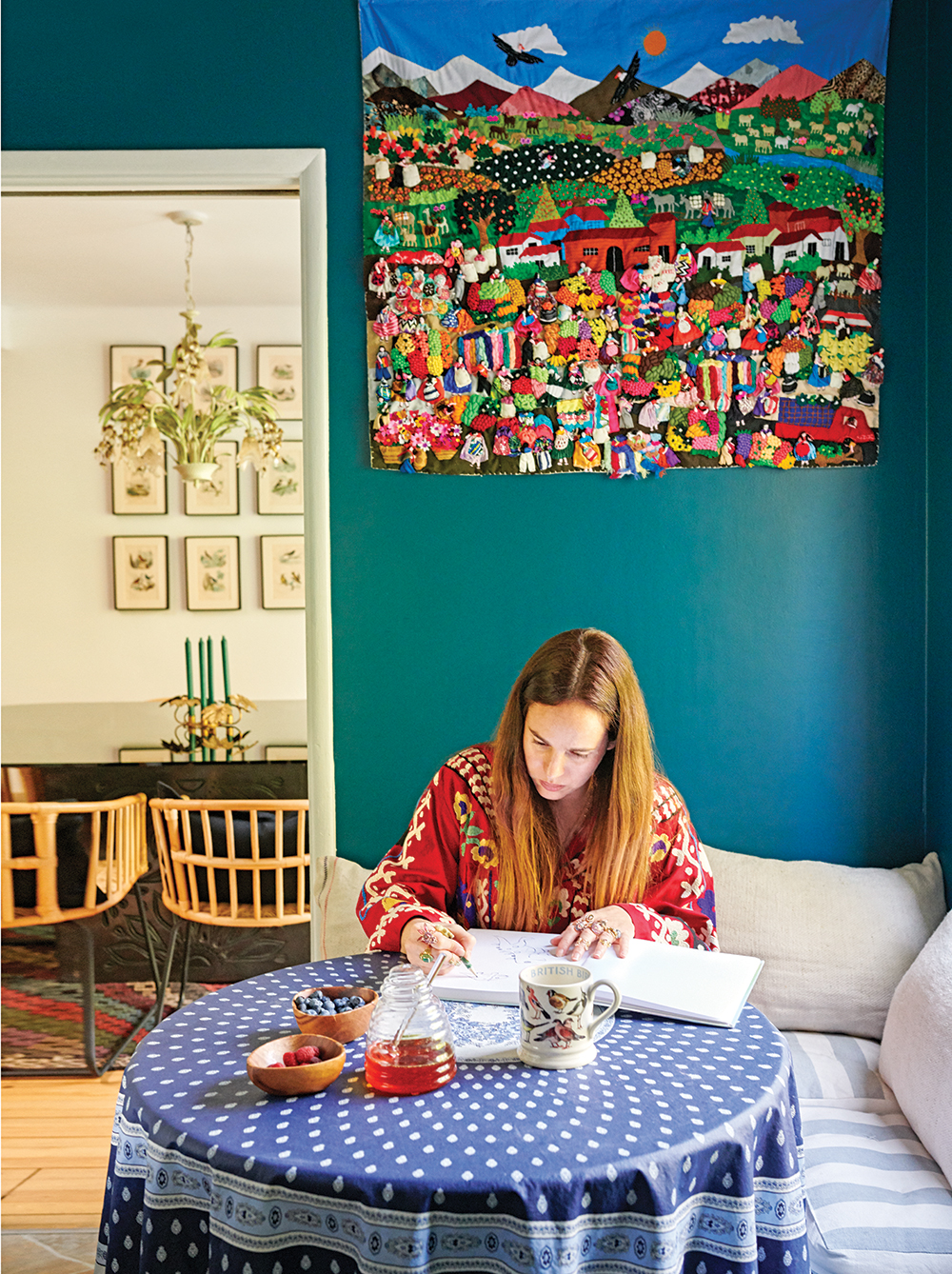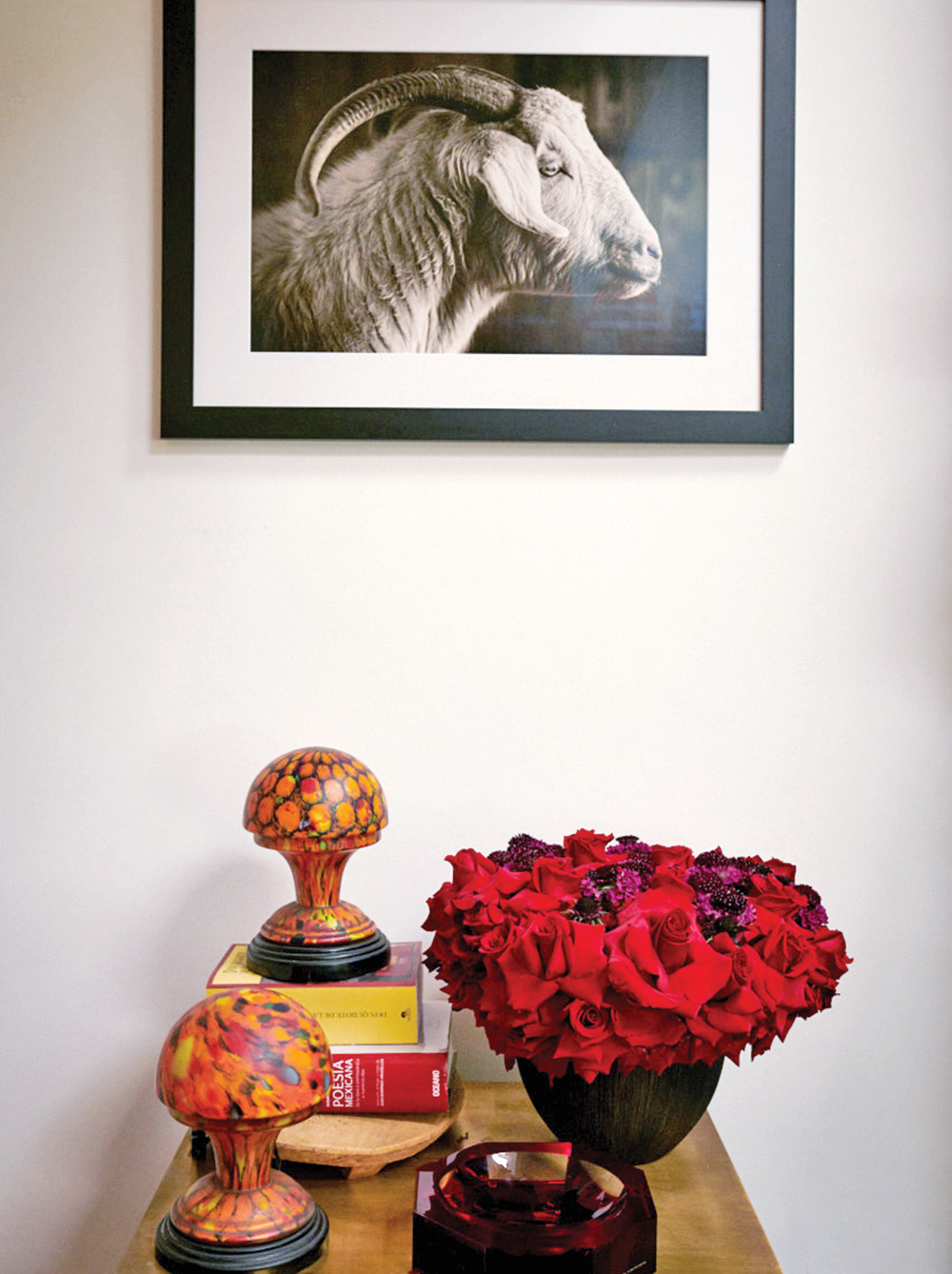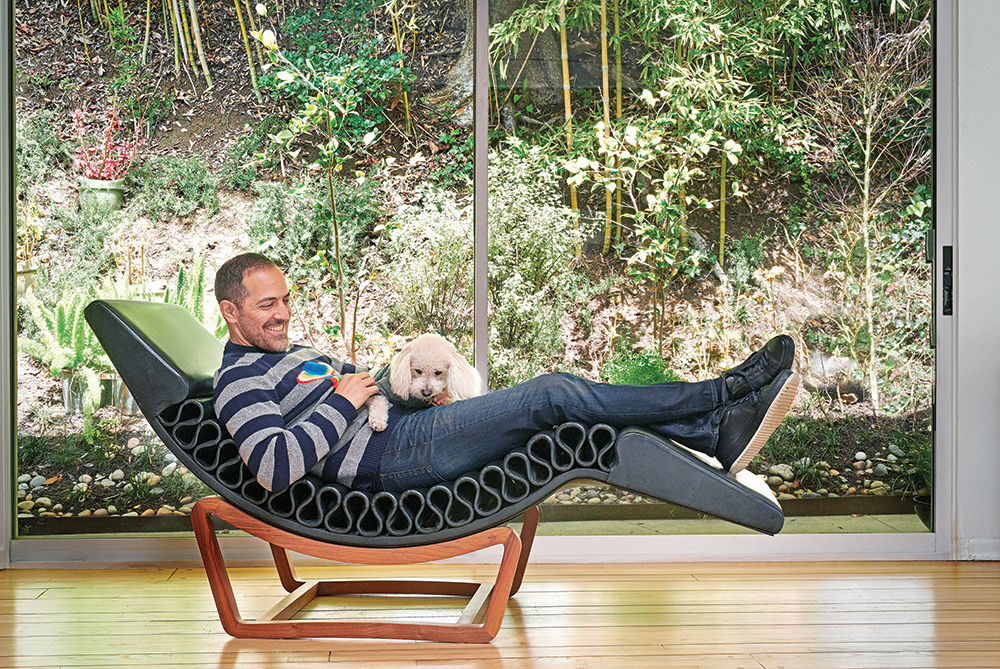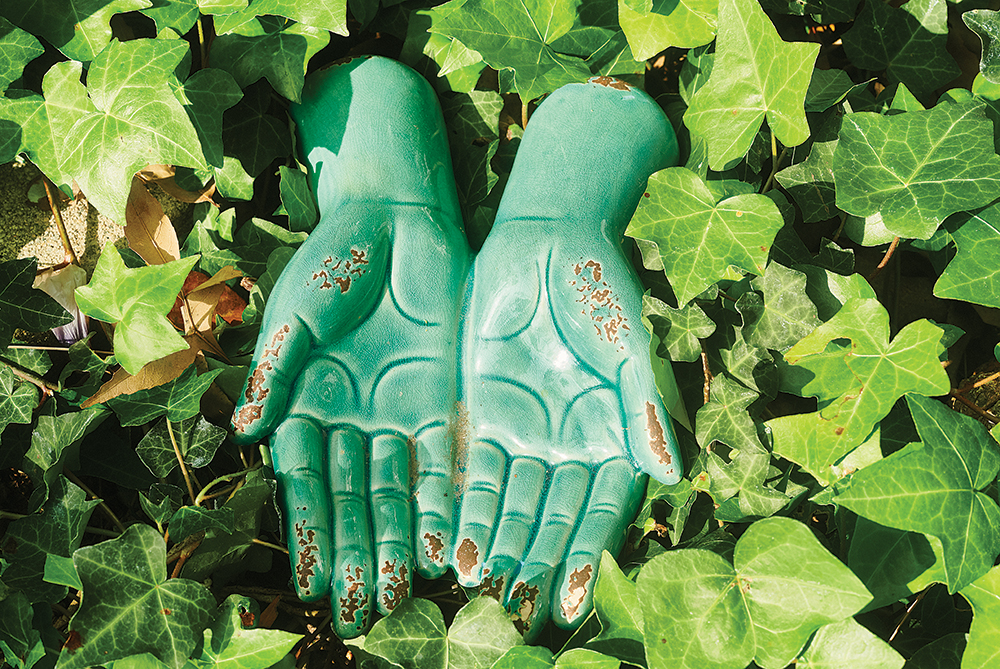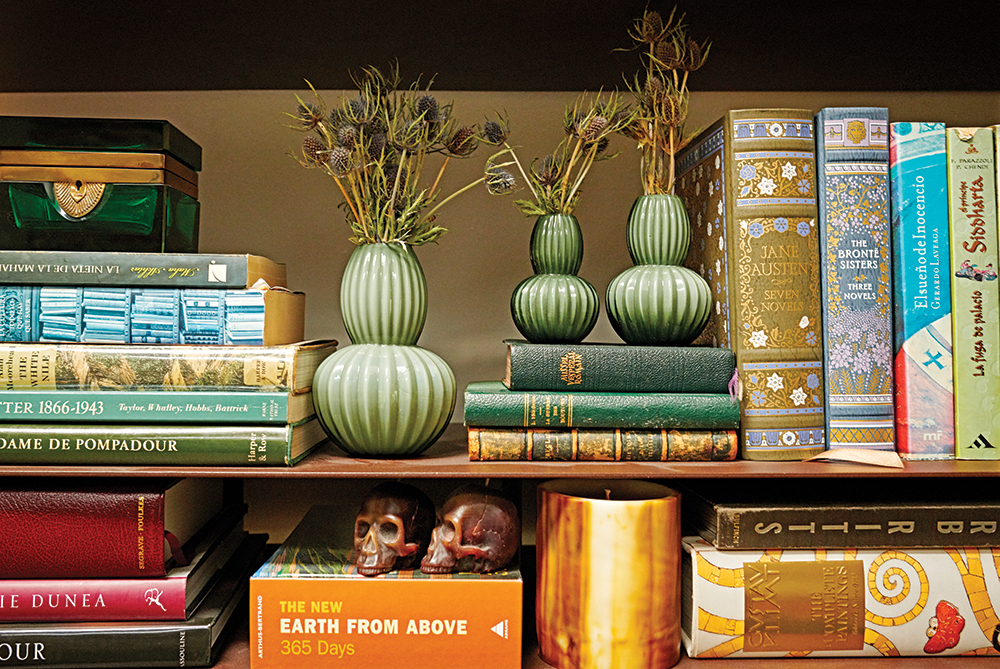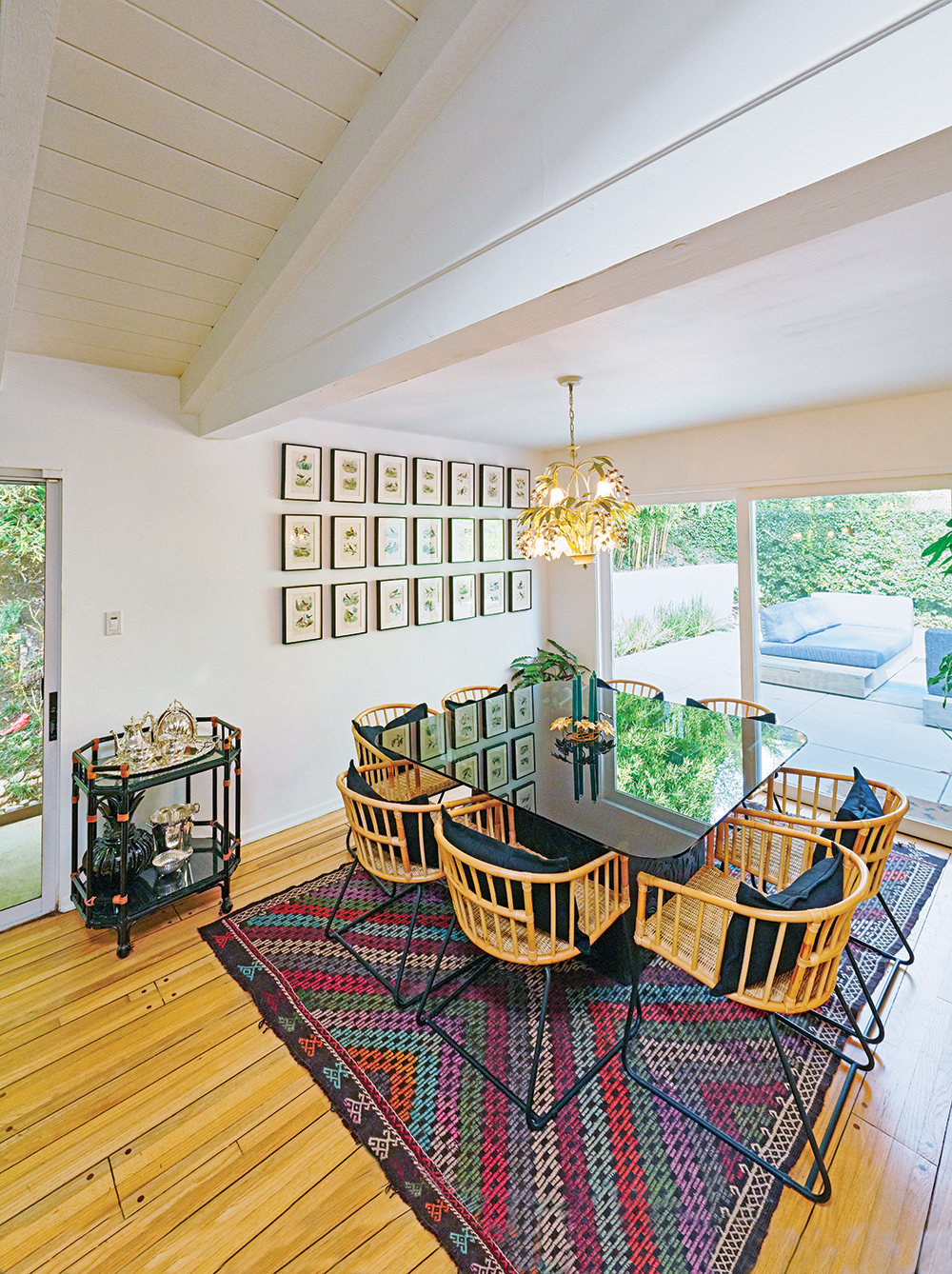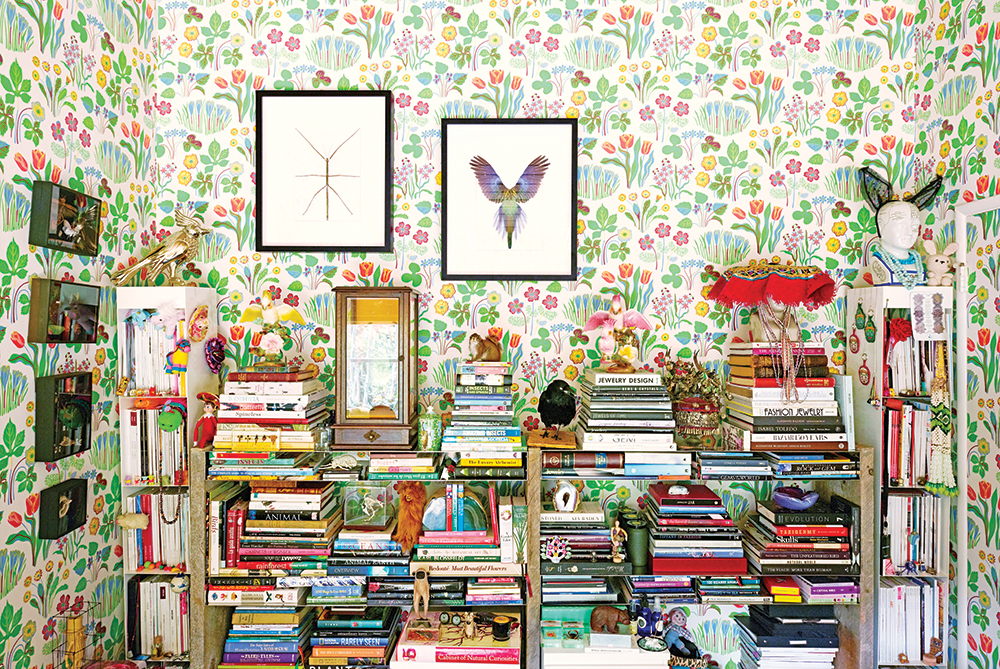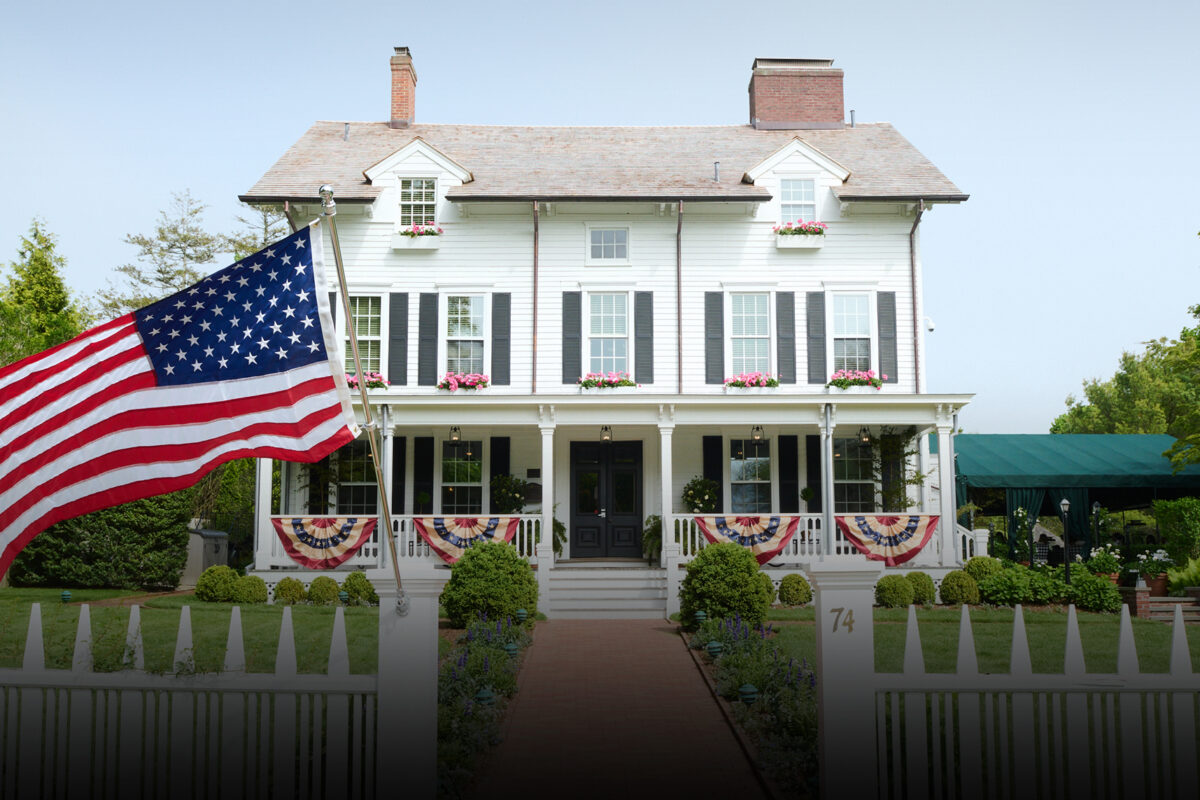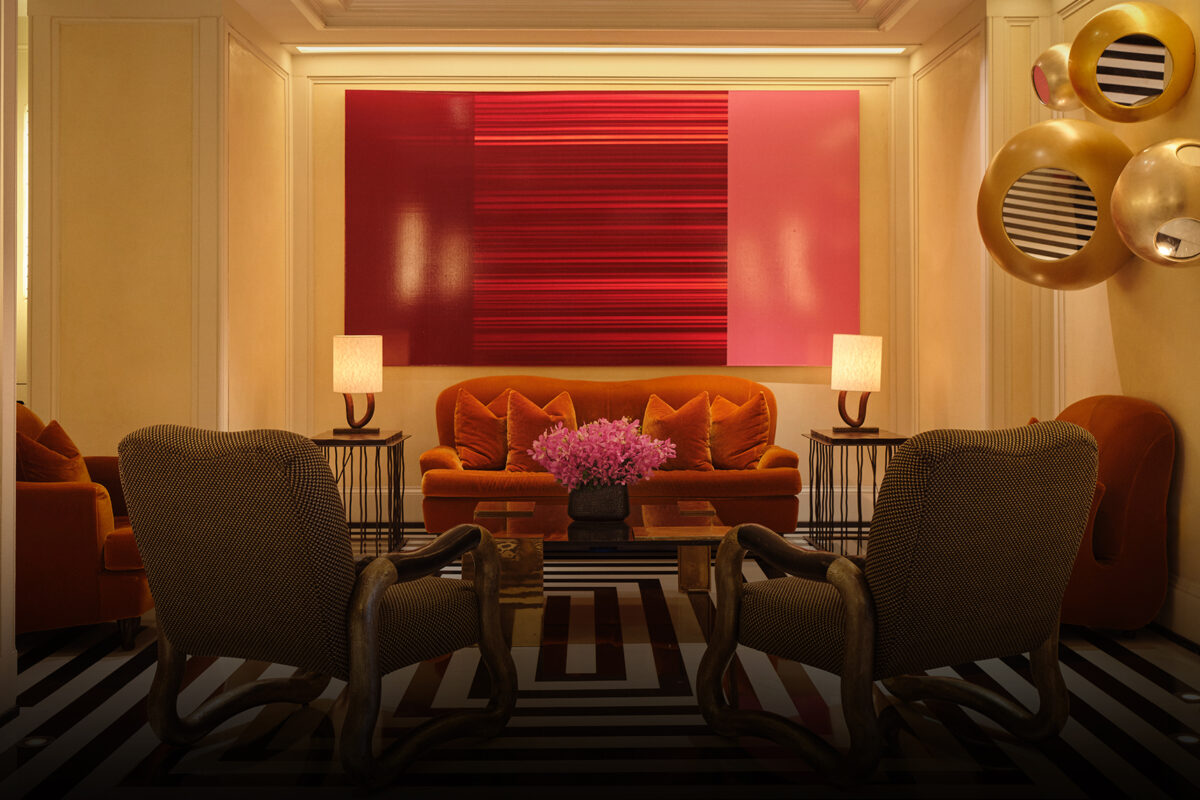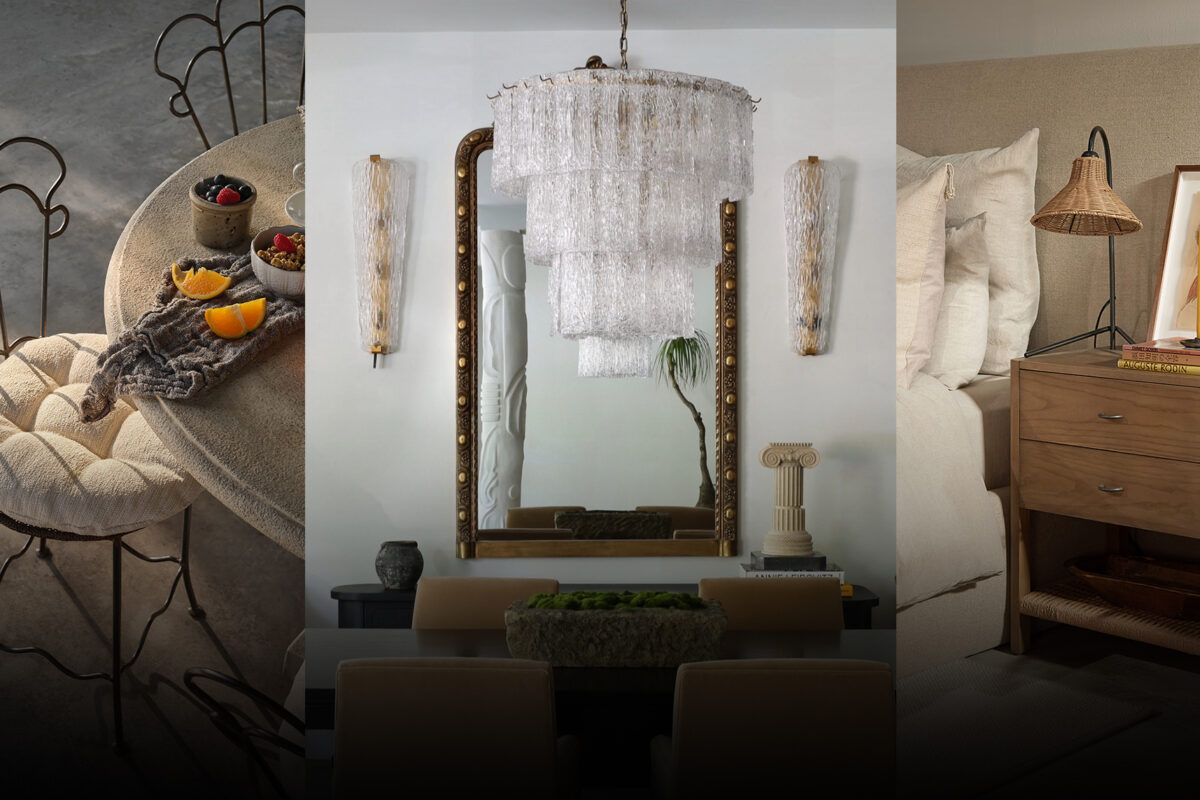Mexican Designers Daniela Villegas and Sami Hayek decorate their L.A. home with amor
Words by PUNCH HUTTON
Photography by RAINER HOSCH
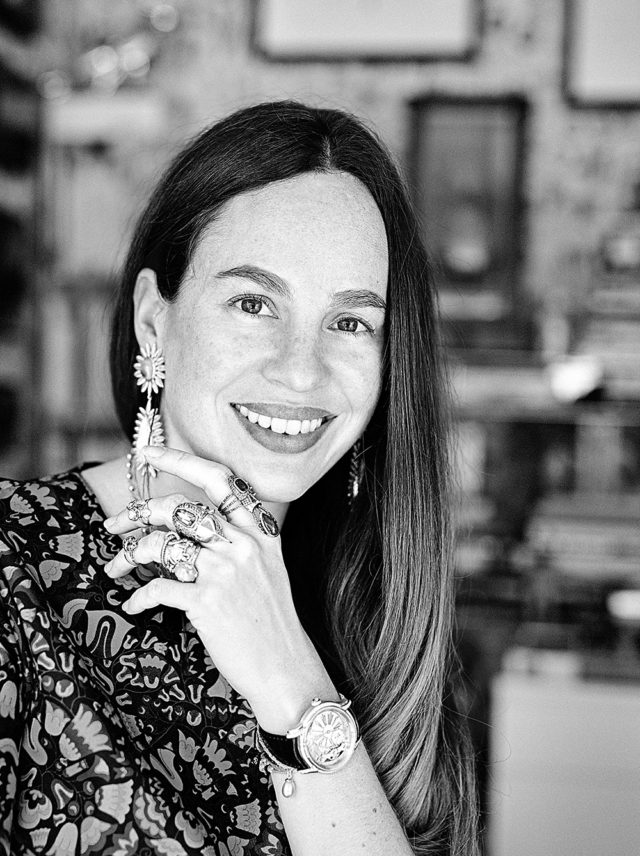
Entering the midcentury modern home of Daniela Villegas and Sami Hayek is like walking into a sublime, real-life cabinet of curiosities. A nearly life-size portrait of Mexican matador Xavier Ocampo, taken by photographer Denise De La Rue, greets visitors near the entry. A green ceramic pig sits in the fireplace. A pair of antique kaleidoscopic lamps—passed down from Villegas’ great-great-grandfather—adorn the living room, which is filled with Hayek-designed furniture and vibrant pillows and rugs. There’s also an ever-growing taxidermy collection: An enormous bison head—the size of a Mini Cooper—gazes out from its perch above the mantel. “He died of natural causes,” promises Villegas. The cozy house, tucked into a hamlet off Benedict Canyon, is the couple’s sanctuary, and they believe in the energy of their possessions. “Objects hold intention,” explains Hayek.
Both natives of Mexico, they are at the forefront of L.A.’s design scene: Villegas, with her beguiling, evolution-inspired eponymous jewelry line (carried in boutiques worldwide, including Just One Eye in Los Angeles), and Hayek, whose impressive portfolio encompasses modern and sustainable furniture lines, residential and commercial interior design, home accessories, and a concept jet for Bentley. Married for eight years, they are a study in how creative partnerships -succeed—each supporting the other’s passion and drive. “Sami encourages me to travel and explore,” says Villegas, whose passport shows entry into Tahiti, Bhutan, Uruguay, Paris and Japan in the past year alone. They are also an irrefutably fashionable pair—with a particular affinity for Gucci dresses, sweaters and fur-lined slides, a sartorial nod to family ties. (Hayek’s sister, actor Salma Hayek Pinault, is married to François-Henri Pinault, the CEO of Kering, which owns the fashion house.)
Predicated on a study of indigenous species around the globe, Villegas’ glittering one-of-a-kind pieces celebrate nature and its inhabitants—from birds to fish to bugs. “I love insects,” she says. “I feel very connected to them.” Designing from home, she divines inspiration from the hundreds of glass-framed specimens that decorate her colorful Josef Frank -floral-covered walls. When creating, Villegas injects an element of whimsy. “I like to make them look friendly so sometimes I make their eyes extra big or give them a smile.” Her collections are as beautiful as they are symbolic. Bejeweled beetles have been a constant since she debuted her brand 10 years ago: Made with 18-karat gold, sapphires, rubies, emeralds and diamonds, they represent strength, power, structure and community.
Other prominent totems, which appear in rings, necklaces, earrings, tiaras and even vape pen holders, include skeletons (believed to harness energy for reinvention and adaptation), bees (symbolizing sisterhood), flamingos (representing grace and balance) and porcupines (whose quills were used to adorn war shirts, quivers and other goods by Native Americans, and are believed to ward off negativity). Villegas chose worms, which symbolize growth and evolution, as the inspiration for the wedding bands she and Hayek wear. Hers is made with rose gold and white diamonds, his with black gold (rhodium) and black diamonds. “When the two rings are stacked on top of each other, they form an infinity sign,” she explains. Like all of Villegas’ creations, everything means something. “There’s a story behind every piece.”
Narrative is also a factor in Hayek’s work. “I started designing because I was interested in how objects and spaces affect and manipulate feelings and behavior,” he says. “I have a passion for materials and for the dialogue that is created when you pair them.” By way of example, he points to a side table in his living room, made from a barro negro (black clay) base with a bronze tabletop. This clay, indigenous to Oaxaca, Mexico, is one of his signature mediums. When he launched his hugely successful Espacio furniture collection at New York City’s International Contemporary Furniture Fair, in 2011, his barro negro pieces, which showcased the craftsmanship of Oaxaca’s artisans, became objects of obsession in the design world. “Every object holds the story of the people who created it,” he says.
While Hayek’s designs (which can be found in the Twentieth showroom in Los Angeles, and via his Hayek Studio website) have multicultural influences, he remains committed to helping artisans in small Mexican communities (in states such as Jalisco and Nayarit) where the Huichol Indians, known for their exquisite beading, live. “These people are like family,” says Hayek. “I go and see what tools and methods and materials they are using. I keep the craft authentic, but I teach them how to tailor their objects for life in a contemporary world.” When pieces are sold, the profits go to their makers.
Spending time with Villegas and Hayek is an indoctrination into their shared world. Culture abounds—from the Spanish they speak to their menagerie of skulls, tucked into bookshelves and nooks throughout their house, which honor Día de los Muertos, the Mexican holiday that celebrates the dead—and also happens to be Villegas’ birthday.
Creative energy hums around them as they each ready to launch their latest projects. Hers is a collaboration with NBCUniversal commemorating the 25th anniversary of Jurassic Park. “I re-created symbols of strength and evolution,” she says of the sparkly, smiley dinosaur pieces, which will be sold through her retailers, including Moda Operandi. On his end, Hayek will soon be launching an outdoor furniture collection with the Brazilian company Tidelli.
And, not surprisingly, the gracious and ebullient pair love to entertain. They have a core group of friends who come for game nights and dinner. “We sit here,” says Villegas, gesturing toward the gorgeous Hayek-designed barro negro, glass-topped dining table, “and play Mexican dominoes or Continental.” (The latter is a card game similar to gin rummy.) “It gets very competitive,” she laughs. Guests sip Hayek’s custom small-batch mescal, Salvación, which will be available in stores later this year, and “we use Postmates. I’d rather pay attention to my friends than be in the kitchen,” explains Villegas. After all, everything for these two comes back to connection. “We are always busy,” says Hayek. “But we are committed to being in the moment.”
This story originally appeared in the May 2018 issue of C magazine.


